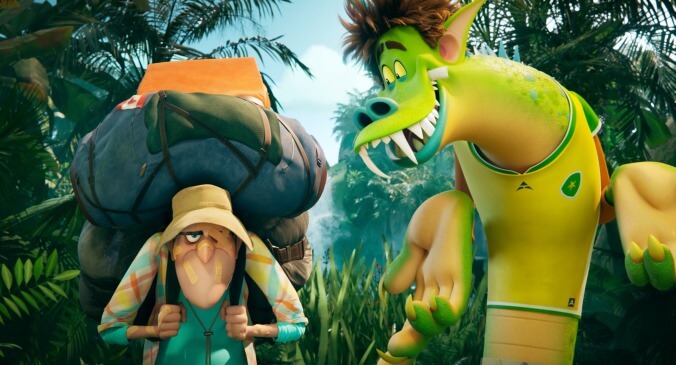Hotel Transylvania loses Adam Sandler, but retains its animated energy in Transformania
The fourth and final movie in the series enlivens a worn-out story with delightful animation

A well-known leading actor removing himself from a franchise in its fourth entry would usually be a sign of major downgrade—a signal that a movie series has lost its mojo. To animation fans, though, the departure of Adam Sandler from Hotel Transylvania: Transformania might be a blessing in disguise. For years, big-studio animation has relied on the invisible star power of celebrities giving undistinguished vocal performances. Now, quite accidentally, the fourth Hotel Transylvania is led by a voice actor: YouTube vocal impressionist Brian Hull.
Now, Sandler wasn’t giving an especially lazy vocal performance in the earlier Hotel Transylvania films. His goofy, SNL-style accent work was a perfect fit for a cuddly cartoon version of Dracula—which Hull capably imitates here. But the Sandman’s abandonment of Drac resolves a long-standing friction between his old-guy sentimentality (the earlier movies are largely about Drac as an overprotective single dad) and the bouncy style of series director Genndy Tartakovsky, who favors wild gags and wilder cartoon poses.
Tartakovsky actually vacates his usual role in Transformania as well; it’s the first Hotel Transylvania picture he hasn’t directed. Instead, he seems to slip into Sandler’s behind-the-scenes role: executive producing, co-writing, and—based on how the characters still stretch and coil their bodies—guiding the comic house style. To that end, veteran animation pros Jennifer Kluska and Derek Drymon take over directing duties. (If Sandler had triumphed in this stand-off, just assume Allen Covert would have somehow been hired as a storyboarder.)
Kluska’s work on the zippy recent DC Superhero Girls cartoon, along with an executive producer credit for co-star Selena Gomez, might create false hopes for greater focus on Gomez’s character, Dracula’s daughter Mavis. Alas, this is yet another Hotel Transylvania story about an aging father with a vision for his perfect family, ultimately learning to let go of the past and accept his daughter’s goofball husband Johnny (Andy Samberg) into the fold. Here, Drac hems and haws over whether to leave his beloved hotel to Mavis and Johnny when he retires, blanching at how Johnny might change the place. And at this point, even Drac’s faithful sidekicks are growing weary of the repetition. Invisible man Griffin (David Spade), werewolf Wayne (Steve Buscemi), mummy Murray (Keegan-Michael Key), and undead monster Frank (Brad Abrell, subbing in for Kevin James, the only major Sandler Guy to leave in solidarity) collectively grouse about being asked to lie to Mavis once again as Dracula works out his issues.
Happily, those issues also include the movie’s most inspired wrinkle: an invention from the mad Van Helsing (Jim Gaffigan) that turns humans into monsters, and vice versa. Naturally, Drac and Johnny both get zapped. Johnny grows a bunch of cool fangs and claws, his enthusiastic gangliness intact. The always-cranky Dracula, meanwhile, turns human and receives a taste of genuine middle age. Bringing monster-powered silliness to life for three movies has apparently left the animators well-prepared to caricature the indignities of human suffering: Just as the Hotel Transylvania movies provide introductory, non-scary versions of classic monsters, Drac’s writhing pains, thinning hair, bloodshot eyes, and copious mosquito bites amount to a kid-friendly version of body horror. Adult companions, meanwhile, may wince in recognition of Drac’s newfound limitations.
After Van Helsing’s machine breaks, the eternally mismatched Johnny and Dracula set off to South America to find the magical crystal needed to fix Van Helsing’s machine. The rest of the ensemble follows, omce Mavis figures out that Johnny may keep mutating until he’s no longer able to change back.
The character and emotional dynamics of these situations are largely old hat, but the filmmakers keep finding new physical dynamics to keep the animation fresh and funny. Whenever a big chase sequence threatens to turn into a de facto theme park ride, the movie will throw out a series of quick-hit gags or harebrained visual ideas, whether big (a cavern of reflective crystals sending the characters’ distorted faces zig-zagging around the room) or small (when Van Helsing needs to defend his basement laboratory, he outfits himself in World War I garb and builds a foxhole, like Bugs Bunny). Indeed, the snaky, topsy-turvy monster Johnny becomes is more fun to look at than any Illumination character ever designed (though, to be honest, this is true of the human Johnny as well).
Whether because of Sandler’s absence or the natural course of the series, Transformania does feel like a wrap-up, and sometimes a hasty one. Why-change-course-now remnants of the other movies’ worst moments are visible in the marginalization of Mavis, as well as its pop-music pandering. Having Drac croon “Just The Two Of Us” feels like a mawkish idea tailor-made for Sandler, while an early deployment of “Cha-Cha Slide” is more revolting than any of the monsters. These are among the many good reasons that the Hotel Transylvania series doesn’t get as much recognition as their Lord/Miller-produced Sony Animation stablemates like Spider-Man: Into the Spider-Verse or The Mitchells vs. The Machines. But it’s heartening to see a big-ticket cartoon franchise end with the animation as its true star.